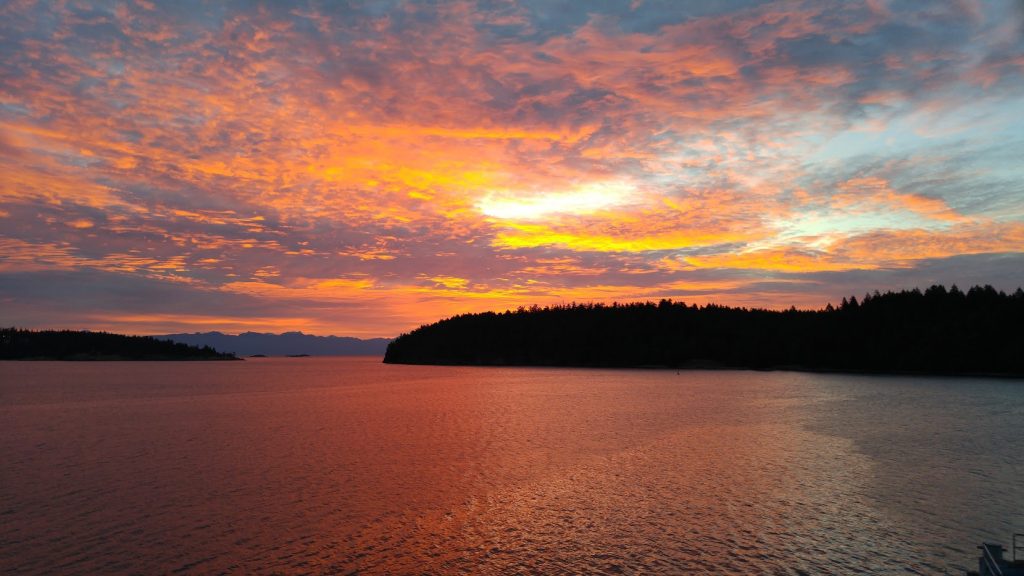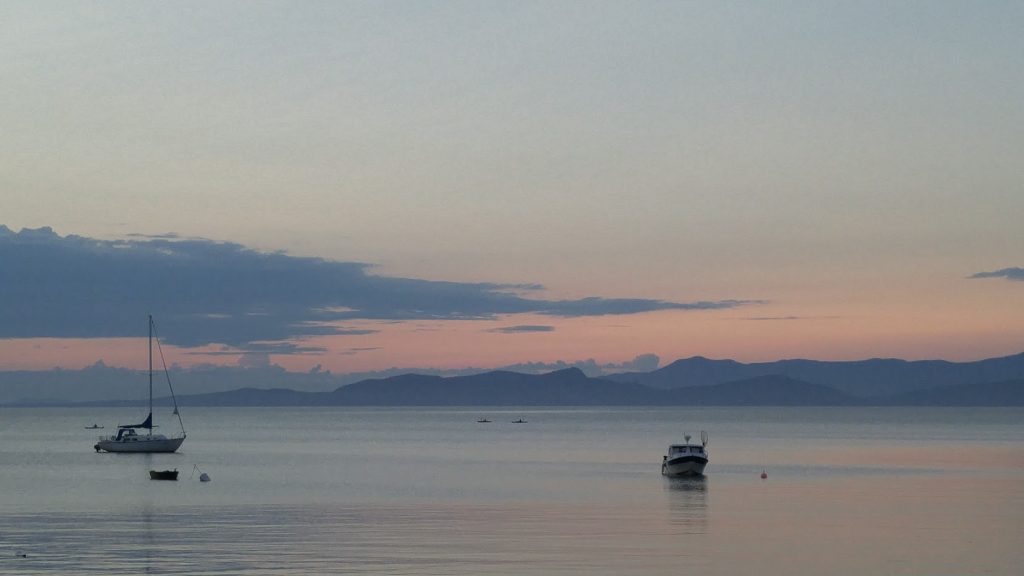I grew up on an island, so the ocean has always been an important part of my image of “home.” Most of my childhood memories feature a back-drop of crashing waves and salty beaches, from swimming or exploring tidal pools with my friends to helping my uncle pull crab pots or repair the dock. For me, at least, I always feel a bit claustrophobic whenever I go someplace where there isn’t any open water–it just seems off. On the other hand, coastal cities are comforting and familiar to me. It makes sense, therefore, that many of the stories and values I encountered as a kid have to do with the ocean.
 My photo: sunset view of Vancouver Island, as seen on the incoming Departure Bay ferry.
My photo: sunset view of Vancouver Island, as seen on the incoming Departure Bay ferry.
The way this story goes is that, once upon a time, two men travelled to Canada. They were each the eldest son of their family, and had been sent to the country from their home in France in order to secure a plot of land and build the prosperity of their two families. They landed on Vancouver Island, though it was likely called something else at the time.
The first man to jump out of their boat landed in the shallow tidal water, and led their boat to land using a rope. This man, who was named Dorcas, helped the other man, who was named Claudet, off their ship and onto dry land. Dorcas, with his wet-shoes, walked beside Claudet, with his dry-shoes, and together they roamed the land and surf for many days, searching for a new place to call home. Luckily, this island was full of very many beautiful places, and soon enough the two had decided on a spot to settle, with a beach close-by for swimming, because Dorcas loved to swim, and a forest close-by for walking, because Claudet loved to walk among nature.
Their first summer, however, they did very little walking and much less swimming, because they had to prepare for winter. So, all summer and all fall, the two worked hard, fishing and chopping wood and doing all sorts of preparatory things. By the time winter came, Dorcas and Claudet had built a house; it was small, but cozy, and would protect them from the chill breeze coming off the water as long as they kept a fire going. Feeling satisfied with their hard work, and having concluded that they would likely survive the winter, Dorcas and Claudet wrote their families back in France, describing their journey and the new beautiful home they had found by the ocean.
Indeed, the two were even more pleased with themselves than they wrote down in their letter–their loved-ones, though well intentioned, were very overbearing and tended to meddle with their lives, and the pair were pleased to gain a little independence from them. However, Dorcas and Claudet heavily underestimated their families’ capacity for meddling! Come spring, when they had planned to finally celebrate their hard work after the long winter, two visitors arrived and crashed their party. Specifically, two French women, who quickly explained that Dorcas and Claudet’s families had told them how to find the men, and that they had travelled all this way so they could get married to each other.
Claudet and Dorcas found the two women to be very friendly and capable, but they couldn’t agree to this plan as they already had lovers; in fact, the two had been each other’s lover from the very beginning! So, they turned the dual proposal down, which left them with a different problem… What would they do with each other? The women couldn’t return to France until the waters were favourable again, which might not be until next Spring, and if they did eventually return, Dorcas and Claudet’s families might just send another pair of marriage-hopefuls…
So, Claudet and Dorcas, and the two women, set out to prepare for winter. With two extra hands, the work went by twice as quick. By the time the first frost hit, a second little house was sitting on the beach, and by the time the last frost thawed, there were two pairs ready to celebrate their new homes.
 My photo: sunset, as seen from my old house. Apparently, the same view that Dorcas and Claudet saw from theirs.
My photo: sunset, as seen from my old house. Apparently, the same view that Dorcas and Claudet saw from theirs.
Your first question upon hearing this story might be to ask whether it is true or not. To be quite honest with you, I’m not sure! I can tell you for certain that I did grow up (and no longer live) on two streets named “Claudet” and “Dorcas.” If my mother is to be believed, the roads were named that way after two French settlers; the version of the story that she always told me involved the two being lovers who escaped their families’ watchful eyes, but then having to figure out what to do with the marriage prospects sent after them. A bit of a strange tale, but one I have a soft spot for! If any of you have any actual information on Claudet and Dorcas, I would love to hear it (I tried to do a bit of research on the topic, but couldn’t find anything online).
One thing I think about now, as an adult, is the implication of this being my story of “home.” How would my understanding of “home,” in its many contexts, be different if I had heard a different story growing up, one from the perspective of an Indigenous person living on the island that I was also living on? What if, instead of wandering and eventually civilising an “empty” island, Claudet and Dorcas had to reckon with the other people living there, too? The story of Claudet and Dorcas is a story which is undeniably about settlers, and operates within a settler worldview with the matching values, more or less. As a settler myself, I am oriented towards reading this tale in a particular light, as a story about the important of independence, determination, and self-expression, or perhaps about the strength of (queer) love, or something else entirely. I am certain there are different interpretations, and definitely ones which treat the inherent settler colonialism more critically! This post is already getting pretty long, though, so I will leave things here, and maybe this discussion can continue in the comments.